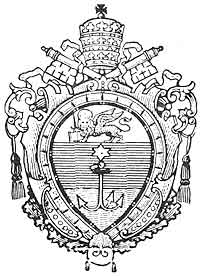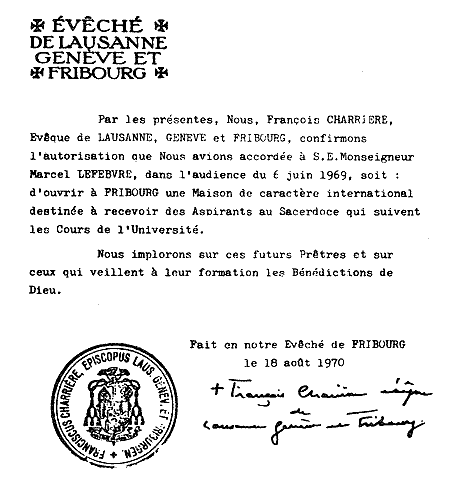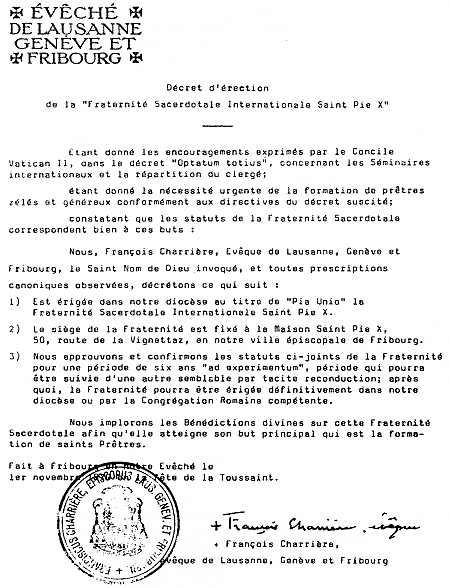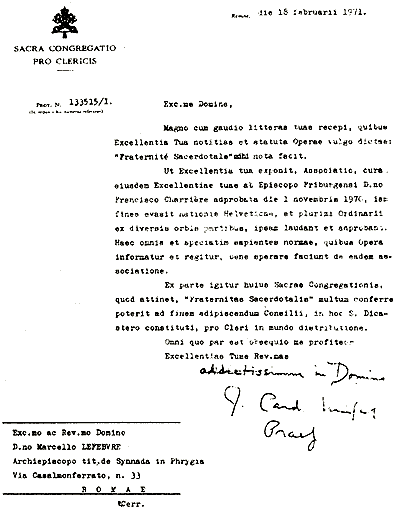Ten Years in the Service of the Church: The Priestly Society of St. Pius X
by Reverend Paul Aulagnier
 |
1969-1970
The Foundation of the Seminary
ON THE AFTERNOON of June 5, 1969, Archbishop Lefebvre met, at the home of Professor Fay, at Fribourg, Switzerland, with Reverend Father Philippe, O.P., and Reverend Father d'Hauterive.
In an office overlooking the Sarine River, around a little table, Archbishop Lefebvre reviews the situation of the Church and of the seminaries. Something must be done. His Grace sketches his idea for the foundation of a seminary in Fribourg. Everything seems right: the good reputation of the Dominican college, the bonds of friendship between Bishop Charrière and Archbishop Lefebvre since Dakar.
Rev. Fr. Philippe is enthusiastic in encouraging the project, and Rev. Fr. d'Hauterive assures him of his aid and support.
A meeting is arranged with Bishop Charrière for the next day, and during this audience, June 6, 1969, Bishop Charrière gives his verbal permission: the Seminary of Archbishop Lefebvre, under the title of Saint Pius X, is founded.
A building was necessary. His Grace found one in a student center held by the Salesians, where he could use the 4th and 5th floors as well as the chapel, somewhat neglected by the students. Since rumors on this subject have circulated and a certain person has written on it, it is worth pointing out that Archbishop Lefebvre has never celebrated the New Mass, the reform Mass, in this chapel, or elsewhere.
In October, 1969, His Grace officially opened the International Seminary of St. Pius X, with nine students, at 106 Route de Marly, Fribourg.
A "Handbook" states the essential principles governing the foundation:
—The rules of the seminary take their inspiration from the Canon Law which expresses the spirit in which the Church means to form Her priests. This spirit is that of Our Lord Himself which has been handed down through the centuries and finds expression in Tradition, the decrees of the popes, declarations of the Councils and canons of the Church.
—No one knows the mind of Our Lord Jesus Christ better than our Holy Mother the Church, royal spouse of the Savior, and hence the meaning of the priesthood which she is responsible for perpetuating, the priesthood which is exercised most fully in the episcopate and, in cooperation with the bishop, in the priest. The priesthood of priest and bishop is nothing else than a participation in the eternal priesthood of Our Savior.
—In order better to understand the great dignity of the priesthood and the nobility of the office which flows from it, the seminarians should above all seek to increase their faith, their knowledge of Our Lord Jesus Christ and the work of redemption which He came to accomplish and in which they will participate intimately through their priesthood.
—They will increase this faith by a careful study of the natural and supernatural realities which are taught in philosophy, theology, Sacred Scripture, Church History, Canon Law, striving to sum everything up in Our Lord Jesus Christ, "to recapitulate all things in Christ" under the guidance of St. Thomas Aquinas.They will learn to know perfectly the works of the Angelic Doctor, especially the Summa Theologica, where they will find the surest nourishment of an enlightened faith, of a deep devotion, of a power of preaching both ardent and effective.
* * *
Things got off to a somewhat shaky start and a year passed amid a thousand and one difficulties. Several students left the seminary because of theological positions taken by Archbishop Lefebvre regarding the reform council.
His Grace summed up his positions in a well-known article which he wrote during the Council and which he published for the first time in Pensée Catholique for June, 1970. In it, he declared that in all areas of the Church a dangerous slippage toward Protestantism was in motion. This article, in part, said;
Without speaking of the unnoticed ways in which the Fathers of the Council found themselves confronted by certain schemas having no roots in the Magisterium of the Church we would like to echo in the following pages that word which the Fathers of the Council could not forget: "Beware!"
Let us beware of letting ourselves be influenced by a spirit absolutely irreconcilable with that which the Roman Pontiffs and earlier councils have tirelessly tried to inculcate in their people. It is not a spirit of progress, it is a spirit of rupture and of suicide.
The statements of certain Fathers on this subject are instructive: some claim that there is no contradiction between the statements of the past and those of the authors of certain schemas, because the circumstances have changed: what the Magisterium of the Church affirmed a hundred years ago was valid for that time but not for ours.
Others take refuge in the mystery of the Church.
Others maintain that the purpose of a Council is to change the doctrine of earlier Councils.
Others think that a Council is above the ordinary Magisterium and need pay no attention to the ordinary Magisterium, but is sufficient unto itself.
Furthermore, one hears the voice of the Liberal press saying that at last the Church has admitted evolution of dogma.
Is it possible to uncover the motive, at least the apparent motive, which has allowed these revolutionary ideas to take official place on the floor of the Council? We think we can say that it was done on behalf of an ecumenism which, presenting itself first as Catholic, became during the Council a rationalist ecumenism.
This spirit of non-Catholic ecumenism has been the battering ram used by mysterious hands in an attempt to shake loose and pervert the doctrine taught in the Church from apostolic days until the present, doctrine for which the blood of so many martyrs has been poured out and which flows even today.
As inconceivable as it may appear, this is a fact. From now on in the history of the Church these ideas will be spoken of, these ideas contrary to the teaching of the Church which, under the pretext of ecumenism, were presented to the Fathers of the Second Vatican Council.
Thus on points of specifically Catholic doctrine schemas were composed which dilute or completely remove whatever would displease the Orthodox and above all the Protestants.1
1970-1971
Recognition by Rome
For the academic year 1970-1971, the major seminary was transferred to 50, Route de la Vignettaz, in a little villa which Archbishop Lefebvre had acquired during the summer vacation of 1970, while the first year seminarians went to do their first year, the year of spirituality, at Ecône, in the former novitiate of the Canons of the Great St. Bernard, purchased a little later by a group of Catholics of the Valais.
In spite of the material difficulties which preoccupied him, His Grace concerned himself chiefly with the sanctification of the Catholic priesthood. On August 18, 1970, he wrote to his seminarians:
|
This first common letter which I send to you from Fribourg I write under the protection of St. John Eudes, apostle of the Hearts of Jesus and Mary and founder of the Eudists. I ask him to give me and to secure for you his zeal, his devotion, his generosity; I write it also after a long conversation this morning with him who represents Holy Church in our area, at least in the area of the seminary of Fribourg, His Excellency Bishop Charriere. His Excellency gave me enthusiastic encouragement and this very day signed the act of official authorization for the foundation of the seminary. He also showed himself very favorable to the establishment of the Society of St. Pius X. So everything is in our favor to continue this work of priestly sanctity. This is what it is all about, whether at Ecône or at Fribourg: to make of you ardent disciples of Our Lord Jesus Christ, with Whom you should clothe yourselves, in Whom you should renew yourselves, as St. Paul says. To know Him, to know God in Him, to live by Him, to pray to Him night and day, to love Him with your whole being—such should be your dispositions—and the fruits of Wisdom, of Truth, of Charity will flood your souls. Community life lived in this Spirit is a grace and a happiness because the virtues of humility, forgetfulness of self, self-abasement, mutual help and service, a striving together toward sanctity—these bring about union and banish disunion and discord. Our Lord gave a specific example of the virtue of obedience which should be the rule of our conduct: obedience to revealed Truth and to the law of God which commands our wills, obedience also to those who have the mission to hand on to us this revelation and this law. This is why I ask you to come in these holy dispositions. Because today the teachings of the Gospel and of Tradition have been weakened or relaxed in daily conduct, because the priesthood tends to be secular and thus to profane itself, because the vices of this fallen world are tending to penetrate everywhere in Christian society and in members of the Church, we understand the appeal of the Heart of Our Savior, of the Holy Spirit, the appeal of the Virgin Mary, "Unless you do penance, you will all perish." This is why we need to preach more than ever the need to do penance, to despise the vanities of this world—by our religious habit, by the cassock, by everything which suggests the lust of the flesh, abstaining from magazines with indecent pictures and articles imbued with a licentious spirit, generally avoiding the movies, television and suggestive music. We wish to keep our souls and our minds pure to approach God and to receive Him in the Holy Eucharist. In doing this, we will imitate all the saints who in the course of the history of the Church have reacted with courage against the errors and corrupt morals of their age. We will truly serve the people of our time if we give them an example of the Gospel lived in the twentieth century. The devil will be let loose against us, but God will bless us and we will continue the fight of the Blessed Virgin Mary against Satan and his fiends. Come, soul relaxed and at peace, open to the Truth, heart burning with true charity toward Our Lord and toward your brothers, soul completely abandoned to the will of God expressed in the voice of your superiors. From now on, let us pray for each other and make the acquaintance of those who are near us in order to help each other upon arrival at Ecône. I greet you in the Hearts of Jesus and Mary and assure you I am entirely at your service and affectionately devoted in Christ and Mary. + Marcel Lefebvre
|
As His Grace announced in the foregoing letter, he received written
authorization from Bishop Charrière, dated 18 August 1970,
confirming the verbal permission given 6 June 1969.
|
|
Archbishop Lefebvre repeated his approaches to Church authorities:
after the official recognition of the Seminary, here is the Decree of Erection
of the Society of Saint Pius X, dated 1 November 1970.
|
|
This work progressed in several dioceses and in several countries. His Grace undertook trips to Rome to obtain for the Society a statute of pontifical right. In this connection he met with Cardinal Antoniutti and Cardinal Wright and spoke with them of his work and handed them its constitution. Cardinal Wright gave witness to the wisdom of these norms in a letter dated 18 February 1971.
|
|
The Seminary is not a "wildcat seminary." The Society is the work of the Church. Unfortunately opposition from certain authorities increased, mainly over the Mass, which His Grace rejected after a careful doctrinal examination of it.
On the afternoon of 10 June 1971, Archbishop Lefebvre met with some seminarians of the House of St. Pius X, Fribourg, and announced to them his intention of rejecting the Novus Ordo Missae—a solemn moment imbedded in the memory of the participants.
The talk lasted two hours, the presentation very carefully worked out, and everyone understood the importance of this historic talk which can be summed up this way:
The use of the Novus Ordo Missae, central act of the Reform Liturgy—has it had wholesome results or does it produce disastrous effects which could be prevented?
The answer to this question will turn our attention to the circumstances of this unique and singular reform in the history of the Church and will enlighten us on our future duties.
To judge of the dogmatic, moral and spiritual value of this reform, we must review briefly the immutable principles of the Catholic Faith on which our Holy Mass is founded. "In the Mass a true and proper sacrifice is offered to God "—De fide divinia catholica definita.
Those who would deny this proposition are heretics.
"Every sacrifice requires a priest, a victim and a priestly action by which the victim is offered."
"In the Mass and on the Cross there is the same victim and the same High Priest." (De fide divina catholica definita).
"The Host or Victim is the same Christ present under the appearances of bread and wine." (De fide divina catholica definita.)
Those who deny these last two propositions are heretics.
Three realities are thus essential for the reality of the Sacrifice of the Mass:
—The priest (priests, and they alone, are ministers—de fide divina catholica) having the sacerdotal character.
—The real and substantial presence of the Victim, Who is Christ.
—The priestly action of sacrificial oblation which is realized in the Consecration.
Let us not forget that these are precisely the three fundamental truths which are denied by Protestants and Modernists.
Let us not forget that to show their refusal to believe in these dogmas that their Masses were changed into worship services, a supper or a eucharistic assembly, with an important development of biblical reading, of the word—to the detriment of the Offertory and of the liturgy of the Sacrifice.
Aside from some small accidental advantages, or rather the only one—the reading of the epistle and gospel in the vernacular—we must unfortunately say that the whole reform directly or indirectly casts a slur on these three essential truths of the Catholic Faith. It is not a question, then, of a liturgical reform comparable to that of St. Pius X, it is clearly a question of a new concept of the Mass. The reformers have not concealed this fact. The normative Mass of Fr. Bugnini, as he explained it in his lectures in Rome, is that which is defined in Section VII of the Introduction to the New Order of Mass.
All the novelties which have been prescribed clearly show the effect of this new concept, which is closer to the Protestant than to the Catholic concept. The claims of the Protestants who contributed to this reform, illustrate naively and sadly how true this is: "The Protestants see nothing to prevent them from celebrating the Novus Ordo."
The question may thus legitimately be asked if, insensibly, the Catholic Faith in the essential truths of the Mass should disappear, the validity of the Masses would disappear also. The intention of the celebrant will clash with the new concept of the Mass which, after a short time, will be a purely Protestant concept. The Mass will no longer be valid.
Now we must be persuaded that the Mass is not only the most important religious act, but that it is the source of all Catholic doctrine, the source of the faith, and of individual, family and social morality. It is from the Cross, extended on the altar, that all graces descend which allow Christian society to live and to develope; stop up the source and you destroy all that flows from it.
These results, which are the fruits of the Holy Ghost described so eloquently by St. Paul in Galations 5:22, are on the point of disappearing from society. Families are divided, religious congregations, parishes are tainted by the poison of disunity. Bishops and cardinals themselves are tainted.
The Catholic Mass has always had as its result the lifting of men toward the Cross, and uniting them to Our Lord Jesus Christ crucified, to stifle in them the stirrings of sin which lead to division. If the Cross of Our Lord disappears, if His Body and Blood are no longer present, men will find themselves around a deserted and lifeless table, and nothing will unite them.
Hence, no doubt, this weariness and boredom which are appearing everywhere; hence, the disappearance of vocations which have no more object; hence, the secularization and profanation of the priest who finds no more reason for his existence; hence, this need of the world. Little by little, through this Protestant conception of the Holy Mass, Jesus Christ leaves the churches, which have often been profaned.
The concept of this reform, the manner in which it has been published, with successive editions unnecessarily changed, the way in which it has been made obligatory, sometimes tyrannically as was the case in Italy, the change in the definition of the Mass in Section VII, without any change in the Rite itself—these are facts without precedent in the Tradition of the Roman Church, which has always proceeded "with counsel and wisdom." They cast doubt on the validity of this legislation and thus, in conformity with Canon 23, "In case of doubt, there is to be no revocation of a law, but the more recent law should be brought into line with the earlier one and should, as far as possible, be reconciled with it."
What remains a duty and an absolute right is the safeguarding of the Faith. And the Holy Mass is the most vibrant expression of the Faith and the divine source of it, whence its primodial importance.
Father Paul Aulagnier is District Superior for the Society of St. Pius X in France. This article was written for and first published in the September 1979, issue of Fideliter, the Society's French journal. Fr. Philip M. Stark provided the translation.
1. This article entitled "To Remain a Good Catholic Must One Become a Protestant" was written in 1964, The entire text may be found in the August, 1980 issue of THE ANGELUS.



